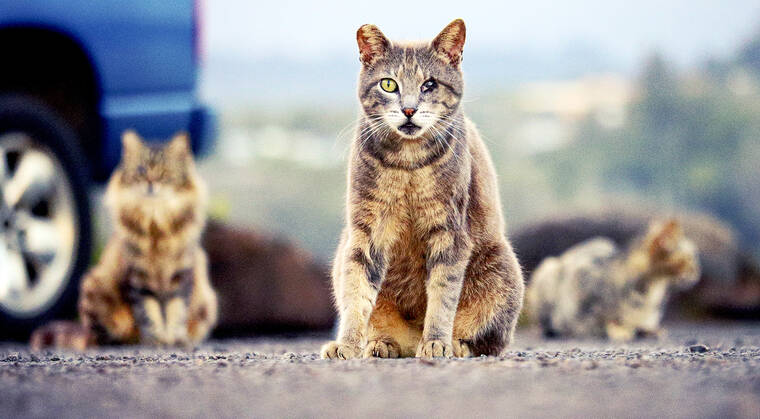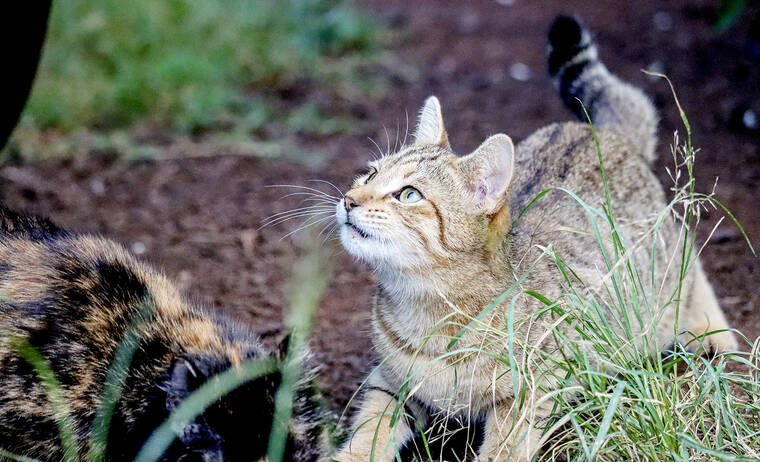LIHU‘E — Speakers from throughout the island, state and mainland urged Kaua‘i lawmakers to ban the feeding of feral cats on county property, at Wednesday’s County Council meeting.
Some, however, contested the ban that’s part of proposed Bill No. 2842, legislation introduced by Kaua‘i County Councilmember Luke Evslin and Council Vice Chair Mason Chock.
The feeding ban would bring Kaua‘i in line with legal obligations made under the Kaua‘i Seabird Habitat Conservation Plan, which permits the county to operate bright nighttime lights that can be harmful to endangered seabirds, in exchange for several mitigation measures.
“One of those measures is the prohibition of cat-feeding on county property,” Evslin explained in a Facebook post following Bill No. 2842’s introduction in mid-January. “By prohibiting it, we are ensuring that the county does not violate the Endangered Species Act, we reduce the potential for costly fines and we help support our endangered waterbirds — many of which exist in the wild nearly exclusively on Kaua‘i.”
The bill also prohibits the abandonment of cats islandwide and reduces the minimum hold time for cats at the Kaua‘i Humane Society from nine days to five days.
A number of residents and organizations from Kaua‘i and beyond oppose the legislation and have argued the ban will undermine privately funded attempts to control the island’s feral-cat population using “trap-neuter-release” procedures.
“We need to remove the cats from high-risk areas, no question,” Liz Stewart, president of the nonprofit Kaua‘i Community Cat Project, testified Wednesday. “If we stop feeding the cats, they will move. If we can’t move them, we can’t find them.”
Stewart, whose group operates programs including a mobile spay bus, was one of four individuals who requested the council table the legislation.
But 17 members of the public, many of whom identified themselves as scientists, conservationists or Native Hawaiians living and working on Kaua‘i, pushed for the bill’s passage as-is.
“It has been observed that a feral cat with a belly full of pet food will still hunt, kill and eat the birds we are working so hard to protect, because hunting is an instinctual behavior for cats,” said Thomas Daubert, executive director of the Friends of Kaua‘i Wildlife Refuges.
Daubert claimed feral cats killed over 251 endemic birds at Hanalei National Wildlife Refuge between 2014 and 2018.
International animal-welfare organization People for the Ethical Treatment of Animals also expressed support of the ban.
“Sites where groups of cats are fed are often set up by people who have them sterilized and then abandon them in programs referred to as trap-neuter-release,” PETA representative Rachel Bellis testified. “These sites actually attract more cats as well as rats and other animals, which creates a public nuisance and increases the risk of contagious-disease and parasite transmission to humans and wildlife.”
The council received reams of written testimony regarding the legislation in addition to the oral
testimony at Wednesday’s meeting. Out of 1,235 relevant submissions to the council in January and
February, 1,103 expressed support for the bill, which will return before the council for second reading.
Cat sanctuaries
Proposed cat sanctuaries, which would contain feral cats in outdoor enclosures to prevent seabird predation, were raised as alternate or supplementary solutions to Kaua‘i’s pending cat-feeding ban.
KCCP’s Stewart discussed her and other local organizations’ plans for such sanctuaries in a Monday interview with The Garden Island.
“It’s acreage that has a pig-proof fence, very robust, very professional, and it allows the cats to be protected,” Stewart said of an existing, unaffiliated sanctuary on Lana‘i.
The cat sanctuaries will “hopefully” be operational on Kaua‘i by the end of 2022, according to Stewart.
Forthcoming “community cat housing” at the Kaua‘i Humane Society could hold animals prior to the sanctuaries’ construction, she added.
KCCP will also roll out a free-roaming cat foster program on March 1.
“All of these initiatives, we’re hoping, will give the county the confidence and the trust in our nonprofits that we will continue to reduce the free-roaming cat population … All this is done in a humane method, versus the current method the county is using (euthanasia),” Stewart said.
Hob Osterlund, founder of the Kaua‘i Albatross Network and a critic of trap-neuter-release efforts, voiced her general support of sanctuaries when testifying in favor of Bill No. 2842 on Wednesday.
“Just know that it’s a limited solution to the problem,” she said.
Osterlund claimed planned Kaua‘i sanctuaries need funding if they’re to become a reality.
“Don’t let the beaches become kitty-litter boxes because you don’t believe in euthanasia,” she said. “Give money and contribute to any of those organizations that are planning sanctuaries.”
•••
Scott Yunker, reporter, can be reached at 245-0437 or syunker@thegardenisland.com. Reporter Laurel Smith contributed to this report.






I thought euthanasia IS humane…??
We have no qualms about killing mice and rats. Invasive pigs… Even wild horses in some states. So why do some people balk at euthanizing invasive, predatory, disease-spreading cats…??! Wild cat sanctuaries are a little much.
You’re wrong. People have humane ways and it’s not killing them. Why do men have to kill as the solution to everything. Use the brain god gave you. Tku
There is nothing kind about dumping domesticated animals who depend on humans for survival on the streets. Cats suffer and die and they kill countless vulnerable birds and other wildlife who aren’t equipped to survive their attacks. The only humane solution is to require that cats be spayed, neutered, and kept indoors.